Story highlights
Missouri dairy farmers sell off cattle because of the drought
USDA official: Legislation is needed to provide help
U.S. is in one of the worst droughts in at least 50 years
Dairy farmers are particularly vulnerable; most are uninsured
Thunder clapped and rain fell just before Bionce, Sassy and the rest of Mark Argall’s prize-winning dairy herd went up for auction.
Had the storm come a few weeks earlier, and if the drought had eased, it might have saved the cows – some of which were named with a bit of poetic license (“You can spell names however you want,” he said) for pop-culture divas and celebrities.
As it was, however, Argall’s pasture was so dry that his cattle had nothing to eat, and the farmer was losing $75 a day just trying to feed them.
Five generations of his family have milked dairy cows in this secluded stretch of Missouri’s Ozark Mountains, but the inch or so of rain that fell on this recent Thursday was too little, too late. Argall – a 54-year-old with a wiry, broomstick mustache – had no choice but to sell nearly all of his cows at a livestock auction.
“We were just trying to hold on, thinking things are gonna change, the grass is gonna grow, the hay is going to be there,” he said. “And it just never did happen.”
During the auction, he sent a friend outside to roll up the windows of his truck. He never would have thought he’d need to close them because of rain – at least not now.
Triple-digit temperatures and sparse rain this summer produced one of the most severe and widespread U.S. droughts in a half-century. Most headlines have focused on the extent of the drought – the fact that it enveloped more than half the country; or that temperatures in July were the hottest for any month on record in the continental United States. Somewhat lost in that national conversation are the stories of Argall and other small-scale farmers who are being pushed out of the only line of work they’ve ever known.
For them – and for the rural communities that depend on their incomes – the drought is far more than a news item. It’s an earth-shattering event, one they worry could lead the dairy communities of southern Missouri to unravel.
And, perhaps saddest of all, farmers say the sell-offs could have been avoided.
“We didn’t fail. We did everything right,” said Argall’s wife, Jeanette. “It was the system that failed us.”
‘It’s frightening’
Other farmers fear they’ll end up in the same spot as the Argalls.
They pray for rain and try to stay afloat financially.
But that limbo exacts a serious toll.
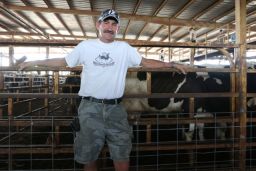
Stacey McCallister, a good-humored 44-year-old who raises dairy cows about 50 miles north of Argall, wakes up many mornings and vomits. The drought has shot his nerves. He doesn’t know what to tell his 11-year-old son when, in tears, he asks his dad if they’ll have to sell all their animals. And he didn’t know quite what to do when six of his dairy cows keeled over, two of them fatally, on a recent morning because they’d eaten a particular kind of grass that was so dry it had become toxic.
“I’d love for my kids to be able to stay on a farm and make a living,” he said. “But I’m gonna tell you: Unless things change, there’s no way.”
The “unless things change” part is key for McCallister. He is both praying for rain – his church, First Christian in Mountain Grove, held an event just for that purpose – and pressuring the government for policy changes that could help small dairy farmers.
This sort of jump into the political fray is unusual in this area, where people pride themselves on a self-sufficient, can-do attitude. The drought hasn’t changed that, but it’s made dairy farmers here feel that some cards are stacked against them.
They’re in the rare position of needing to ask for help.
And they’re not necessarily getting it.
The Obama administration earlier this month announced emergency drought assistance that included low-interest emergency loans; a federal buy-up of meat from livestock producers; and the opening up of some protected lands for livestock grazing.
None of those efforts are targeted at dairy farmers, however, dairy advocates say.
Missouri’s governor, meanwhile, created a cost-share program to help farmers get access to water for their cattle, but McCallister said that’s more of a Band-Aid than a real solution.
Michael Scuse, under secretary of the U.S. Department of Agriculture, said dairy farmers have not been offered enough of a safety net because Congress has not finalized an omnibus piece of legislation called the Farm Bill.
“Had we had a Farm Bill passed by now, there’s a very good chance we could offer some additional assistance” to dairy farmers who are struggling because of the drought, he said.
Several programs that deal with emergency assistance for livestock owners expired in September 2011; and an insurance program for livestock producers, which he said “never had adequate funding,” will be cut further in September and eliminated by October 1 unless new legislation is passed, he said.
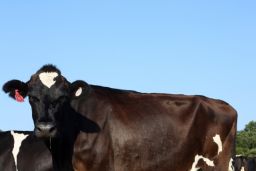
Earlier this summer, the U.S. Senate and the House’s agriculture committee passed versions of the five-year bill, which includes everything from food stamps to crop insurance. Much of the debate about the bill centers on programs to feed low-income people. The House returns from August recess on September 10, and could take up the measure then.
The bill in its current form would create an insurance program specifically for dairy farmers. Currently, most dairy farmers are uninsured, according to officials and policy experts; that makes them more vulnerable to the impacts of a drought or high feed prices, both of which have taken hold now.
The price of corn nationally more than doubled from July 2010 to 2012, to $7.36 per bushel, and hay prices have risen nearly 65% over the same period to $184 per ton, according to the National Agricultural Statistics Service. On the ground in Missouri, however, real prices can be twice that for hay and at least a $1 per bushel more for corn, since those materials have to be trucked in from wetter regions, said Larry Purdom, president of the Missouri Dairy Association.
And, some dairy farmers here want to see the federal government suspend a rule requiring one-third of the U.S. corn crop be converted to ethanol. There’s some evidence, as Reuters reports, however, that removing the requirement would do little to help.
McCallister relayed some of these concerns to his congresswoman, U.S. Rep. Jo Ann Emerson, when she visited the area this month. Emerson has tried and, so far, failed to push through emergency drought legislation that would aid dairy farmers. The Republican took to the House floor with a photo of McCallister’s dried-up farm to make her point.
On a recent morning, she met about a dozen dairy farmers beneath a shade tree at an agriculture research station in Mountain Grove.
She sure got an earful.
“We need to be able to buy feed for our cattle to meet this winter’s needs or there’s gonna be people standin’ here that’s not gonna be standin’ here next time,” McCallister said.
“You made a penny off your last sale, didn’t you?” the congresswoman prompted.
McCallister: “Feed price was $15.50 and milk price was $15.51. I probably lost $5,000 last month. That’s where we’re at. The more cows you milk, the more money you lose.”
She vowed to follow up on the issues.
‘They become your family’
It took only 30 minutes for an auctioneer to sell Mark Argall’s 33 cows.
As rain pattered on the metal roof of the auction barn, they were showcased one by one behind a metal fence and in front of a 100-person crowd. Bright lights hung over the scene. An announcer offered motorboat-speed commentary, jabbering about weight and price and quality of their coats. Two men with long metal sticks smacked a wall of the cage and poked the cattle to try to keep them spinning like ballerinas for the buyers, who selected cattle by making almost imperceptible motions – a wink, the tap of a finger.
All of it was, of course, difficult for Argall to watch. He chewed on the tip of a pen and sighed as Bionce, Cupcake, Maggie Mae (“You ever hear of Rod Stewart?” he said) and the rest earned less than half what they would have before this drought.
“They’re not just numbers on a computer,” he said. “They’re members of the family.”
His wife, Jeanette Argall, took it harder. She fled to her sister’s house in Arizona that week so she wouldn’t have to be around for the sale.
Jeanette Argall grew up near Kansas City, and when her husband brought her to his parents’ farm near Stockton, “she didn’t know which end of the cow the milk came out of,” he said. But she took to dairy farming with unexpected gusto, naming each member of the Argall family herd with great care and decorating their kitchen with literally hundreds of cow-themed knick-knacks. There’s a cow-shaped kettle on her stove; dozens of plaques for their achievements in “cow shows” cover the wall.
“I love cows. I love dairy farming. We eat, we breathe, we sleep dairy cows,” she said. “It’s a passion. It’s a way of life. When you work so closely with these animals they become your family.”
To a city dweller, that may sound far-fetched. But think about it this way: The Argalls witnessed the births of most of their cows; they fed them with cartoonish, oversized baby bottles when they were young; they talk to them; they know their personalities; they pat the necks of the nervous cows as they walk into a milk barn where vacuum-suctioned devices are stuck onto their udders to extract milk with mechanical, rhythmic efficiency.
The night before the auction, Meredith Argall, Mark and Jeanette’s 33-year-old daughter, went out into the fields near Ava, Missouri, to say goodbye to her friends.
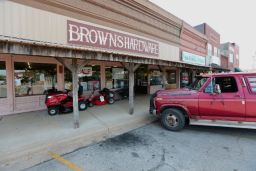
Among them was one of her favorites, Norman – named after the main character in “Psycho.” Norman was moody and a bit insane, but she trusted Meredith Argall.
“I told her she had to go somewhere else,” she said. “Whether God was going to take her or whether she was going to a new home, (I told her) that we couldn’t take care of her anymore.”
This is the kind of family where a husband would give his wife bull semen for her birthday, just because she is so keen on developing the best herd possible – to help their business grow, and to show the rest of the world how strong their herd was.
“She wanted him bad, bad, bad, so I surprised her with it,” Mark Argall said of the bull, Black Star, whose genetics he bought for his wife’s birthday more than a decade ago.
As one rainless day after another passed, the Argalls fought the idea of having to sell their cattle. But one day, Jeanette Argall said, a check for their milk came in the mail. The price had dropped. Their pastures were too dry to feed their cattle and, without getting more money for the milk, they weren’t able to buy them enough to eat.
“I just couldn’t take it,” Jeanette Argall said, explaining why she left for Arizona before the day of the auction. “I couldn’t stand watching people coming in and out of here with trucks and loading up my family.”
Community on the brink
An hour or so up the road, cow food is about the only thing Green Acres Dairy is trucking in.
“About three weeks ago, I was about ready to change the name to Brown Acres.”
That’s Roy Oliphant, 30, who owns this farm with his wife, Jessica, who is so in love with the cattle they raise that her Facebook photo is a picture of Precious the cow.
The young couple went $400,000 in debt to buy the farm a little more than a year ago. They recently applied for a $20,000 loan, they said, to pay for some of the hay they need to help the herd survive the winter.
They hoped to be the next generation of farmers for the area.
Now they’re “fighting to keep the place,” said Jessica Oliphant.
“It’s just not working,” the 27-year-old said. “It’s not going to be very long before we don’t have any farmers around here.”
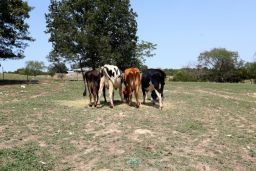
Mountain Grove, the 4,800-person dairy town that links all the farmers in this region, is starting to feel the pinch of the drought as well. It’s a relatively nondescript place, where white houses have porch swings and wind chimes hang from gutters. At the town square, Western-style brick buildings with wooden awnings surround a patch of walnut and oak trees. And one business, Brown’s Hardware, has an ominous sign in the window:
“Going out of business”
“We rely on the farmers,” said Joe Robertson, 76, who has worked there for more than two decades. “It’s dry and hot. (The farmers) couldn’t get out to do anything.”
It could be just the first sign of trouble.
“There’s a huge ripple effect” from the drought, said Emerson, the congresswoman. “If a farmer is making a profit – not a big one, but a little one, even – then they’re going to go to the grocery store. They’re going to go to the implement dealer. They’re going to go to the beauty shop. They’re going to go to the Hallmark store. They’re going to utilize the services that are in those communities. And if our farmers aren’t buying anything, then the implement dealers suffer. The hardware store suffers. Everybody suffers.
“And that’s how you start having rural America wither away.”
Mountain Grove’s mayor, Delbert Crewse, says the concerns are overblown.
Town sales tax revenue is down more than 10% compared to a year ago, he said. But revenue is always variable, he said. “It will hurt the city,” he said, “but it’s not gonna be no closin’ of the city or anything like that.”
As more and more dairy farmers here sell their herds, however, others believe the drought could be the event to push an already struggling area and industry over the edge.
The day the Argall family sold off 33 of their cattle at the Norwood Producers Auction, about 10 miles west of Mountain Grove, four other farmers did the same. This year, 30 farmers have done so at that particular auction barn, according to its owner, Brian Hoover. All told, more than a third of Missouri’s dairy cows will be gone by the end of the year, thanks largely to the drought, said Purdom, from the dairy association.
“It gets worse every day,” he said.
The return home
After the cows went to auction on August 16, Jeanette Argall called her husband and asked him to drive to Arizona to pick her up. She’d made a mistake, she said. She shouldn’t be away from the family farm during such difficult times.
So Mark Argall drove three days, round trip, to bring her home.
They arrived on Tuesday at about 2 a.m.
“I just sat in the truck and I just bawled.”
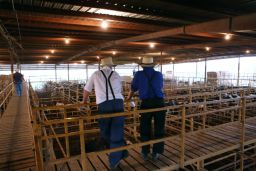
Before the drought, the family had about 100 cows. Dozens were sold off bit by bit before the auction. Fortunately for the cows, while some of those auctioned off at Norwood did go to slaughter, many went to other dairy farms.
The family decided to hang on to only five of their prize cows. They’ll drink the milk, make some dairy products, and give some of it away to their neighbors.
But they’re out of the business.
“I got up this morning and looked out and the farm looks bare without the cows,” Jeanette Argall said. “You just sit here and you just shake your head and you’re like, ‘Now what?’”
They trust God has a plan for the family.
They just don’t know what it is.
“I’m going to have to figure out what I’m gonna be when I grow up,” Mark Argall said.
He’s thinking of moving the family – with the five remaining cows, Gypsy, Olivia, Jezabel, Brandy and Annalese – to Alaska so he can work on an oil pipeline. He’d never been west of Kansas before he drove to Arizona to get his wife. But at least, in Alaska, he knows there would be work. Or maybe he’ll get a truck driver’s license. Or maybe they’ll sell cheese at a local market. Who knows?
None of that is what he really wants, though.
“I never wanted to do anything but milk cows.”
Just like his great-grandfather, grandfather, father and children have.
“It’s just a helpless, godawful feeling,” he said.

The night of the auction, Mark Argall came home to milk the few cows left on his farm – his five and a handful he’d already sold but was waiting to deliver.
He and his daughter, Meredith, walked through the dark and rain to their dairy barn. As the cows filed in, father and daughter petted them and offered comfort during the storm.
Just as they were finishing up, at about 8:30 p.m., the power cut off and the room went black.
“You’ve got to be kidding me,” Mark Argall said.
It was the weather.
After some fumbling around, Mark and Meredith Argall let the cows back out into the pasture and made their way through the rain and back into their home.
Mark Argall bit a flashlight in his mouth and lit three candles.
“You’re not going to find a dairyman that isn’t an optimist by nature,” he said, trying to stay upbeat. “It’s just a prerequisite, I guess.”
Minutes later, the lights popped back on.
Are you experiencing the drought where you live? Share your story with CNN iReport.
Drought may yield benefits for wineries and wine lovers
Farmer in the drought – if you plant it, it might not come
